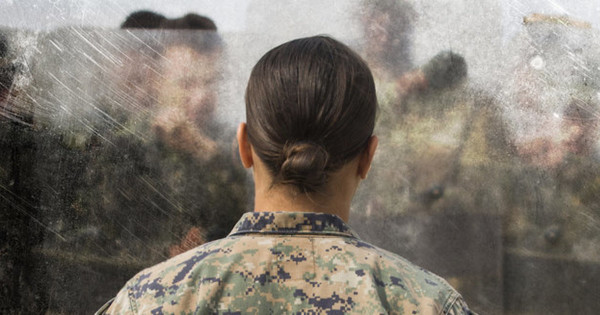

The Defense Department saw a three percent increase in reports of sexual assault last year, according to a new report released on Thursday.
According to the Fiscal Year 2019 Annual Report on Sexual Assault in the Military, a total of 7,825 reports of sexual assault involving service members were made last year, up from 7,623 the year before.
Of that total, 6,236 reports made by service members indicated they were sexually assaulted during their military service.
The Pentagon points to increases in reporting as a positive sign, saying that it illustrates troops are more comfortable coming forward and that the DoD will “continue to encourage greater reporting to ensure that victims receive the appropriate resources, such as medical and mental health care, that increase their likelihood of recovery.”

Almost every service saw an increase in total reports. The Army had 3,219 total reports; the Air Force had 1,683; and the Navy had 1,774. The Marine Corps, however, had 1,149 reports of sexual assault — a 6% decrease from last year.
This year’s report did not include a prevalence survey of sexual assault, which happens biannually. Instead, it primarily provides takeaways from dozens of focus groups conducted during the fall of 2019, which included a total of 493 active duty troops and Sexual Assault Prevention and Response (SAPR)/Sexual Harassment/Assault Response and Prevention (SHARP) staff.
Unit climate was a key focus area for the report and, according to the focus groups, culture in the military is “heading in the right direction, albeit slowly.”
The focus groups also said that service members in grades E-4 to E-6 were “uniquely positioned” to help young enlisted service members because of their day-to-day interactions, and that they could heavily influence behavior depending on what they choose to address.
One positive trend the focus group data showed is that men’s sexual assault cases “are taken more seriously now” than they have been in the past.
But the report also said that cases of assault against male victims “were described as hazing more often than cases involving female victims” and identified stigmas of masculinity as a barrier for men to report their assault.
While the report says that the military’s “male-dominated cultural norms are slowly changing,” it’s clear that there is still a lot of work to be done.
A second report released on Thursday provided key themes that came up in the focus group discussions, ranging from gender discrimination in the workplace to where, how, and why sexual harassment and assault occurs.
Participants said that “leadership favoritism of one gender over the other” was one of the recurring issues men and women faced. They also said that there is still the perception that some people are placed in certain jobs because of their gender, not because of their qualifications.
“Some participants pointed to their perception that female service members manipulate male service members and/or military systems to get ahead or avoid deployment,” the report said.
Participants also said that female service members “who dress more feminine or display their emotions” are judged more heavily for not blending in.
“It’s that weird link of saying it’s not professional to wear makeup or it’s not professional if your nails are done,” one female junior officer in the Navy said. “But the code word there is that it’s not professional to be a woman or to be feminine.”
Women said that their male peers don’t know how to recognize discrimination or harassment, which makes it hard for them to acknowledge that it exists. They also emphasized the importance of men and women sharing their experiences with one another to make it clearer what sexual harassment and assault looks like “across scenarios and situations.”
“Because even [men], things happen to them and girls are like, ‘How did that even happen? That makes no sense. You’re a guy.’ It goes both ways,” a junior enlisted female Marine said. “I don’t think that we give each other enough credit and we don’t listen to each other enough.
“It’s [women] against [men] and [men] against [women]. And we’re not united.”